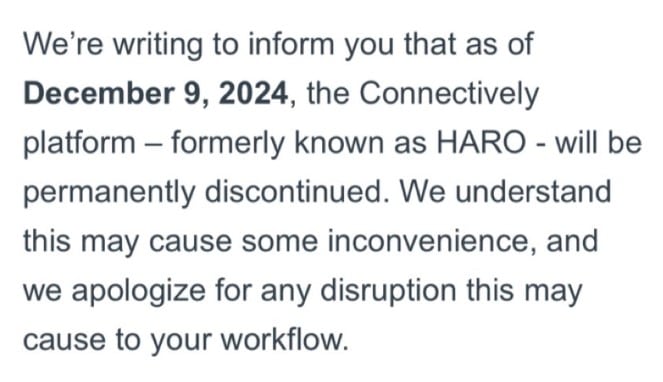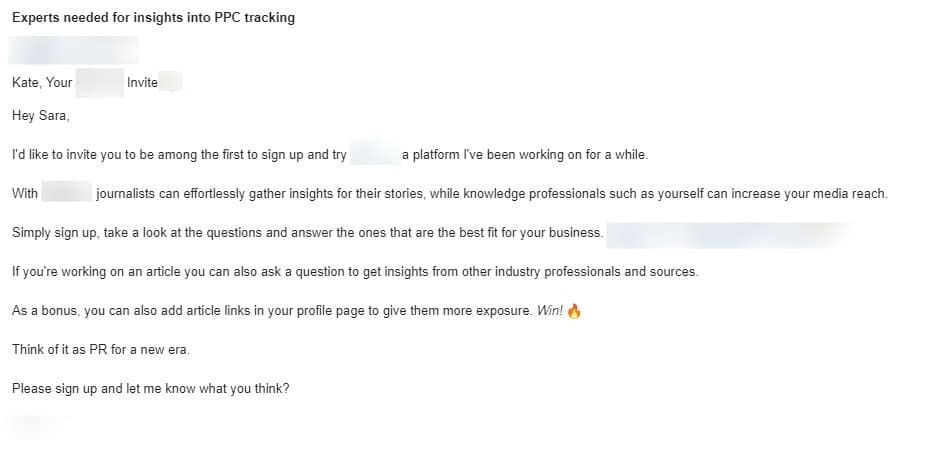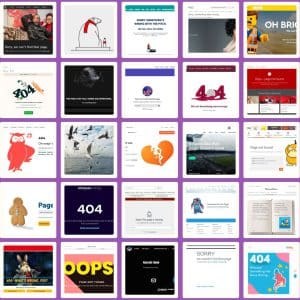Looking to get backlinks for your website? Journalist request sites like Qwoted, Help a B2B Writer, and the now-defunct HARO are a fantastic way to get links and boost brand awareness. Check out some great journalist request sites as well as the dos and don’ts of replying to pitches.
Getting backlinks is a massive pain in the proverbial. There, I said it.
You have to create great content, and you have to persuade high-quality websites to link to your content too.
And it looks like I’m in good company – one-fifth of marketers say getting backlinks is the most challenging part of search engine optimisation (SEO)!
The good news?
There is a relatively easy way to get backlinks and establish yourself as a thought leader in your chosen industry.
Introducing the humble journalist request site or pitching platform.
You can use journalist request sites to identify backlink opportunities and boost your presence in the search engines.
Want to get those all-important backlinks? I’ll explain what journalist request sites are all about, which ones to try, as well as how to create a pitch that publishers love.
But first…
The importance of backlinks
You can split SEO into three main components.
- Technical SEO, which is all about optimising your website for speed and crawlability
- On-page SEO, which concerns page readability and using the right keywords
- And off-page SEO, which is all about SEO that happens off your website. A big part of this is backlinks
So why are backlinks to other websites so important for SEO?
Search engines like Google want to prioritise the most trustworthy, credible content.
After all, they don’t want to promote dodgy, spammy web pages!
Backlinks act as a vote of confidence in your website. If another website links to yours, it shows the search engines that you’re a reliable source of information.
So, the more links you get from relevant, high-quality sites, the more your SEO gets a boost.
According to Ahrefs, two-thirds of web pages don’t have any backlinks, so if you get at least one, you can get a significant advantage over your competitors in Google!
This leads us nicely onto how to use journalist request sites.
What is a journalist request site?
A journalist request site is a platform that connects publishers like journalists, bloggers, PR specialists, and writers with potential sources. It works in the following way:
- A publisher looking for a quote for a piece of content puts out a request looking for sources
- The platform collates all the requests and emails them to the sources that subscribe to the service
- Sources reply to publishers with their quotes. If the publisher likes the quote, they’ll use it in their content
- As a thank you for using the quote, the publisher includes a link back to the source’s website
The first pitching platform to gain prominance was HARO, or ‘Help a Reporter Out’. When I used to work in marketing many years ago, I’d sign up to all of HARO’s mailing lists in the hopes of getting some column inches for the company I worked for!
HARO became part of PR software provider Cision about ten years ago and was rebranded as Connectively in 2024. Although nobody called it that, like how everyone still calls ‘X’ Twitter.
In November 2024, Cision announced it was shutting HARO down, and a million journalists cried into their early-morning flat whites.
Journalist request sites to get started on
While HARO was the most famous of all the pitching platforms, there are lots of other ones out there too. Different publishers have their favourite sites, so to get a good spread of requests, it’s definitely worth signing up to as many as you can.
Here are some of my favourites.
Qwoted

Qwoted is probably the most well-known platform on this list, You get emailed pitches and publishers can view your responses on the platform.
You can only respond to two sources a month for free, and there’s a two-hour delay before you receive relevant pitches
You can pay $99 a month for unlimited pitches and the ability to respond straight away.
Help a B2B Writer
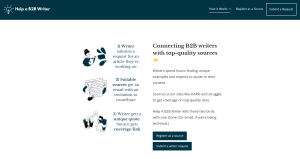
I get a lot of mileage from Help a B2B Writer as a source, as well as a publisher. If you want to register as a source just enter your details, specify the type of pitches you want, and you’ll get an email everytime something comes up.
You do get a lot of emails though, especially if you sign up to multiple categories. I recommend creating a filter in your inbox so you’re not deluged with requests!
Sourcebottle
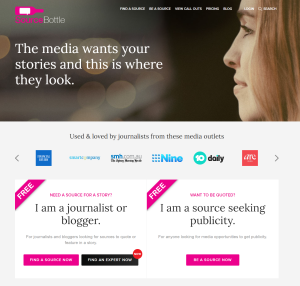
Sourcebottle – you’ve gotta love the name right? This platform works very similarly to Help a B2B Writer.
While you have to sign up to see all of the pitches, you can see a few examples on the website. If you’re on the fence about signing up, this is a good way to see if Sourcebottle is right for you.
Hashtags you might find useful
If you’re on social media, in particular X, there are hashtags you can follow. Publishers use these to reach out to people they want quotes from.
Give the following a try:
- #JournoRequest
- #PRRequest
- #BloggerRequest
How to increase the chances of a publisher using your quote
So you’ve signed up to all the pitching platforms; now how do you get those all-important quotes and links?
I’ve been on both sides of the process as a source and a publisher. This means I know what you need to do to boost the odds of getting your quote picked up.
Here are my top tips for using journalist request sites to get backlinks.
Read the request thoroughly first
Read the request from start to finish and make sure it’s something you want to provide a quote for before putting a response together. I also recommend checking out the publisher’s website to see if it’s one you want to be associated with – some sites are a bit skeevy.
(Qwoted is really good if you want to see the reputation of a publisher as you can access their profile, which has a photo and samples of their previous work.)
It’s important to understand what the publisher is asking for. I once put out a pitch for examples of websites – a surprising amount of people forgot to include a link to their site!
If a publisher gets a lot of responses, they’re not going to spend time chasing you up for missing details.
Also see if there’s anything that excludes you from replying.
Often I only ask for pitches from businesses with in-house marketing teams. This means if you represent a a digital marketing agency I can’t use your quote, no matter how great it is.
Make sure you’re well-placed to provide your thoughts
One of the things I’ve noticed when asking for pitches is that the same names pop up every single time, even if your request is totally irrelevant to their business.
Here’s an example – I once put out a request asking for plumbers to advise how they use SEO to improve their search engine presence.
I got a response from a personal trainer from an American chain of gyms.
Unless you’re unblocking toilets in your spare time, I don’t want to know.
The thing to bear in mind here is that if I’m writing a piece for a client, they want to hear from someone with relevant experience that can provide an authentic outlook.
If I include a quote from Mr. Personal Trainer in an article about plumbing SEO, they’re highly likely to take it out of the final draft. They’re also highly likely to chew me out for putting an irrelevant quote in their article.
I recommend adding one or two sentences at the start of your pitch explaining your experience in the industry.
That way, even if your connection isn’t obvious, you’re still spelling things out to the publisher and showing how you can add value.
As an FYI, getting a link on a website unrelated to your business can hurt your backlinking efforts.
Low-quality and irrelevant links are considered link spam in Google, potentially leading to your site being demoted in the rankings.
Respond promptly (but not too fast)
Most articles with tips for pitching will recommend that you respond as soon as possible (within thirty minutes to an hour) to increase your chances of being chosen as a source.
I’m going to come at this from a completely different angle and a potentially controversial one.
As long as you send your quote in by the deadline, that’s what counts.
Will some publishers want a quote ASAP? Yes, especially if they need a quote for a publication like a daily newspaper.
However, the majority of publishers will try to give sources as much time as possible to respond so they can get high-quality quotes.
This takes the pressure off and means you can take your time crafting a solid response.
Personally, I’d rather wait a day for a decent quote than five minutes for a half-arsed one.
In fact, responding too quickly can put you at a disadvantage.
It can make it look like you’ve submitted a generic copy-and-paste response or used AI, which is a massive no-no. I’ll talk about AI in more detail later.
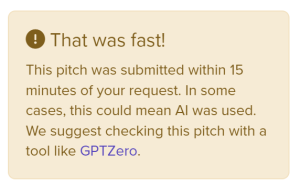
While I can’t speak for everyone who asks for quotes, in most situations, I wait until the deadline has passed. I then read through all the responses and choose the ones I want to use.
This means responding first doesn’t necessarily provide any significant benefits.
Is it worth responding after a deadline has passed?
You’d be surprised how many people do.
Case in point, I specified a cut-off of Monday 5pm for a quote. By Tuesday morning, I’d had about six emails come through after the deadline.
Interestingly, it always seems to be the same people who reply late, making me think that there is some kind of strategy to doing so.
Either that, or they’re just bad at time-management.
In my opinion though, it’s a massive gamble. Unless the publisher is running late creating their article or you have a quote that will blow their socks off, the chances are that your pitch is going to be ignored.
Just wait for the next pitch request to come along. Trust me, you won’t be sat there twiddling your thumbs for long.
Offer something that nobody else can
Once I asked sources to provide their top tips for doing SEO.
Most of the responses were generic things I could have found on the first page of Google.
Do keyword research, write high-quality content, submit guest articles… If it’s not going to wow me, it’s not going to wow my client.
I then got a quote from someone talking about local SEO and how it’s often overlooked in the SEO process.
They provded a personal anecdote about how they created a Google Business Profile for a client and went into detail about the tangible results they got.
For example, how much web visits and booked appointments increased by. They even included a little chart they’d whipped up in Excel.
That quote got my interest and was the one that I used.
The person you’re pitching to will get many quotes, and 99% of them will talk about the exact same things.
Do a little reverse psychology – imagine what your nearest competitor would say and talk about something different.
Statistics and data increase your chances of being chosen too.
After all, what sounds better?
- We increased the number of leads we received
- We increased the number of leads we received by 125% over three months
Keep it short and quotable
Journalists and other publishers want concise, snackable quotes that slot nicely into the content they are writing.
If you send a 1,000-word essay, they’re going to scan through it, sigh, and move quickly onto the next pitch.
Keeping it short and quotable works in your best interests too.
The longer your quote, the more likely the publisher is to trim it down and amend it to use it. This increases the risk of you potentially being misquoted.
How long should your pitch be? It depends on what the publisher is asking for.
If they want a simple quote about a particular topic, I’d recommend keeping it to about 150 words. If they want something a little more detailed, try and keep your quote under 300 words.
I always advise including your contact details at the bottom of your message.
That way, if the publisher really likes your quote but wants you to expand on what you’ve discussed, they can get in touch.
Don’t use AI
A year or so on LinkedIn, I read a post from a frustrated content writer.
They’d submitted a request on HARO, which someone had responded to. They used the quote in the article they were creating, and all was right with the world.
Or so they thought.
They’d been duped by a schemer who had ‘tricked’ them into using a quote generated using artificial intelligence (AI). They then created and distributed a report shaming the content writer (and others) for accepting a quote written with AI.
I won’t link to the report because the last thing that person needs is more publicity.
This is an extreme example, and I’m sure everyone using AI isn’t that sneaky.
However, generating a quote using AI is not a sensible approach. Publishers want quotes from real people, not computer algorithms.
Here’s a quote I received from someone on a journalist request site. Look at this wording and tell me it wasn’t generated using Chat GPT. It says too much without saying anything at all.

You get what you put in with pitching platforms. Make the effort, and you’re more likely to make the cut. Spend twenty seconds knocking together an AI-generated quote, and you’ll go into the ‘rejected’ pile.
Some sites actually give publishers a heads-up if they think a source used AI. For example, this message pops up on Qwoted if it spies generative AI. Don’t say I didn’t warn you.
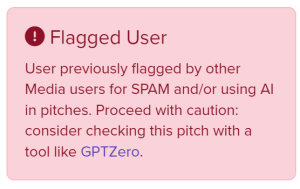
Don’t waste people’s time
Want to get a publisher hot under the collar? Here are some of the worst things you can do when submitting a quote:
Try and set up a Zoom or Teams interview
Publishers want quick quotes and they want them in a hurry.
Unless they specifically ask to interview someone over the phone or video communication software, don’t try and arrange something.
Chances are that they won’t have the time to accommodate you.
Sell your products or services
Publishers know you’re not giving a quote out of the generosity of your heart – you want a backlink in exchange for your time.
However, you should never try and shill your product or service directly in your quote.
This is glaringly obvious and means the publisher will have to hack your quote to bits to get something they can use.
Send a link to an article or page on your website
Every time I ask for a quote on a topic, I get at least one person that just sends a link to an article on their website saying, ‘I hope this is useful’.
Honest answer?
It’s not. I can’t do anything with that, which means you go directly into the ‘rejection’ pile.
Ask pointless questions
There may be times when you’re not sure you’ll be accepted as a potential source, and you want to message the publisher to get some clarification.
I understand that it takes time and effort to get something from the relevant person in your business, I honestly do.
The issue with this is that publishers get lots of quotes from potential sources.
This means most of the time they’re not going to have the time or inclination to get back to you.
My advice? Dive right in and answer the question to the best of your ability.
If a publisher doesn’t use your quote, you’ve got something you can repurpose for another time.
Send lots of follow-up messages
I’ve lost count of the number of times people have connected with me on LinkedIn and sent me a message saying ‘so… are you using my quote or what?’
The majority of publishers get a lot of pitches, so they can’t feasibly contact everyone who reaches out.
Most publishers (myself included) will send you a message if they use your quote.
So if you don’t hear anything, this probably means that your quote hasn’t made the cut on this occasion. Don’t sweat it, and move on to the next pitch.
If you’ve been told that your quote is going to be used, no doubt you’ll be super-keen to know when your link will be published.
However, if a publisher is working on behalf of a third-party, the decision is usually out of their hands. This means 99% of the time you’ll be told ‘I don’t know’.
Here’s a handy hint: sign up to Ahrefs Webmaster Tools or Google Search Console. Both of these platforms are free and show you links to your site.
This means that if you don’t hear back from a publisher, you can see if your quote has resulted in a backlink.
Send a holding statement
A holding statement is a message saying you’re interested in responding and you’ll send over a quote as soon as possible.
This approach just fills a publisher’s inbox with worthless emails.
It’s also a futile endeavour – unless you’re trying to get a quote from a Kardashian, a publisher isn’t going to wait around for you.
Just send the quote when you have it – no need to make an announcement.
Use a publisher’s email for sales purposes
This is the number one thing you can do if you want to tick off a writer, journalist, or blogger.
Some platforms hide a publisher’s email address, while others encourage you to directly respond to the publisher’s email.
The problem with this approach is that some sources harvest the email addresses and add them to their mailing lists.
Over the course of being a publisher I’ve got the following:
- People offering to write articles on my behalf
- PR agencies sending me random press releases
- PR agencies offering to act as a source off platform
- Companies trying to sell me products and services
Here’s an email I got from someone trying to plug their own alternative pitching platform.
They couldn’t even be bothered to get my name right – that’s a cold email fail right there!
Do not send emails like this under any circumstances.
Not only can it get you into trouble from a data protection perspective (hello GDPR), but it’s an easy way to get ignored.
You might even get banned if enough people complain about your misconduct.
What are the chances of your quote being used on journalist request sites?
I can’t speak for everyone that uses pitching platforms, but I typically get about twenty-five to thirty pitches for each request I put out there.
As I generally only use one or two quotes each time, this puts your chances of your quote being used at between three and eight per cent.
Not a fantastic percentage, but you can increase your chances of success by offering a well-written, unique, and relevant quote.
Don’t get disheartened if your quotes don’t get picked up and you don’t get those backlinks.
Sometimes, it’s a matter of timing and publishers have to go with the first pitch they get. Ideas for content can get dropped at the last minute. Your quote might not quite match the tone of the article.
I speak from experience here – I’ve submitted a lot of quotes in the hope of getting backlinks that have come to nothing at all.
All you can do is keep trying. When you get that coveted backlink, it will be worth your time.
So… are journalist request sites worth it?
Pitching platforms like Qwoted and Help a B2B Writer can be a great way to get backlinks for your site quickly, but you need to put the effort in.
It’s not just a case of sending a generic quote to multiple publishers and crossing your fingers.
Quality is better than quantity when it comes to link building.
Choose requests that are relevant and that you’re an authority in, and you’ll be better equipped to craft a high-quality pitch.


